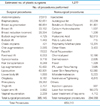Abstract
Due to Confucian ethics and socioeconomic factors, aesthetic plastic surgery came late to Korea. However, the field of aesthetic plastic surgery developed rapidly after the establishment of the Korean Society of Aesthetic Plastic Surgeons in 1985. At present, Korean aesthetic plastic surgeons have achieved world leading surgical skills and research abilities. This article review the history and current state of Korean aesthetic plastic surgery with the follow-up study of statics and numerical data. Over the period of 10 years (2001-2010), the Korean plastic surgeons contributed 607 papers to SCI & SCI(E) journals. Among them, the number of pure cosmetic surgical papers was 133 (21.9%). According to biannual survey data from the International Society of Aesthetic Plastic Surgery in 2009, the number of plastic surgeons and aesthetic procedures in Korea became the highest contrast to percentage of the population in the world. As dynamic forces of development for Korean aesthetic plastic surgery, this advocate the medical tourism, non-surgical cosmetic procedures, and adipose-derived stem cells. With developing these items, Korean plastic surgeons will create the brilliant future of the aesthetic plastic surgery in Korea.
Figures and Tables
Table 2
Number of aesthetic surgical & non-surgical procedures performed in 2009 from Korea (From International Society of Aesthetic Plastic Surgery. ISAPS international survey on aesthetic/cosmetic procedure performed in 2009 [Internet]) [11]

References
1. Lew JD. The last fifty years of western medicine in Korea: Korean Society of Plastic and Reconstructive Surgeons. J Korean Med Assoc. 1997. 40:1025–1029.

2. Baek SM, Baek RM. Problems in aesthetic contouring of the facial skeleton in orientals. Prob Plast Reconstr Surg. 1991. 1:667–682.
3. Uhm KI, Shin KS, Lew JD. Crane principle of the cross-leg fasciocutaneous flap: aesthetically pleasing technique for damaged dorsum of foot. Ann Plast Surg. 1985. 15:257–261.
4. Hwang K, Kim CW, Lee CS, Lee SI. Scientific publication productivity of Korean plastic surgeons: an analysis of 1974-2000 SCI papers. J Korean Soc Plast Reconstr Surg. 2001. 28:163–168.
5. Won CH, Kang DH, Koo SH, Park SH. A survey of Korean college students' cognition of cosmetic operation. J Korean Soc Aesthetic Plast Surg. 2004. 10:51–58.
6. Chang CH, Cho MS, Seo SW, Hong YG, Oh KS. A study on the knowledge about the plastic surgery (II). J Korean Soc Aesthetic Plast Surg. 2005. 11:218–224.
7. Chang CH, Lee DH. A study on the knowledge about the field of plastic surgery (I). J Korean Soc Plast Reconstr Surg. 1993. 20:539–552.
8. Ryu JE, Suh IS, Seo KH, Lee JH, Park HY, Park SS, Kim JH, Kwon YD. The expectation and satisfaction of college women on aesthetic surgery. J Korean Soc Aesthetic Plast Surg. 2002. 8:159–168.
9. 2008 AAFPRS membership study [Internet]. 2009. cited 2011 May 17. Alexandria (VA): The American Academy of Facial Plastic and Reconstructive Surgery;Available from: http://www.aafprs.org/media/stats_polls/aafprsMedia2009.pdf.
10. American Society of Plastic Surgeons. 2009 Report of the 2008 statistics: clearinghouse of plastic surgery statistics. 2009. Arlington Heights: American Society of Plastic Surgeons.
11. ISAPS international survey on aesthetic/cosmetic procedure performed in 2009 [Internet]. cited 2011 May 17. Hanover (NH): International Society of Aesthetic Plastic Surgery;Available from: http://www.isaps.org/uploads/news_pdf/Methodology_ISAPS_Survey2009.pdf.
12. Fraser JK, Wulur I, Alfonso Z, Hedrick MH. Fat tissue: an underappreciated source of stem cells for biotechnology. Trends Biotechnol. 2006. 24:150–154.

13. Noel D, Caton D, Roche S, Bony C, Lehmann S, Casteilla L, Jorgensen C, Cousin B. Cell specific differences between human adipose-derived and mesenchymal-stromal cells despite similar differentiation potentials. Exp Cell Res. 2008. 314:1575–1584.

14. Nakagami H, Morishita R, Maeda K, Kikuchi Y, Ogihara T, Kaneda Y. Adipose tissue-derived stromal cells as a novel option for regenerative cell therapy. J Atheroscler Thromb. 2006. 13:77–81.

15. Seo DR, Han SK, Chun KW, Kim WK. Clinical application of adipose derived stromal cell autograft for wound coverage. J Korean Soc Plast Reconstr Surg. 2008. 35:653–658.
16. Cho SW, Kim I, Kim SH, Rhie JW, Choi CY, Kim BS. Enhancement of adipose tissue formation by implantation of adipogenic-differentiated preadipocytes. Biochem Biophys Res Commun. 2006. 345:588–594.

17. Kim MH, Kim I, Kim SH, Jung MK, Han S, Lee JE, Nam JS, Lee SK, Bang SI. Cryopreserved human adipogenic-differentiated pre-adipocytes: a potential new source for adipose tissue regeneration. Cytotherapy. 2007. 9:468–476.

18. McIntosh K, Zvonic S, Garrett S, Mitchell JB, Floyd ZE, Hammill L, Kloster A, Di Halvorsen Y, Ting JP, Storms RW, Goh B, Kilroy G, Wu X, Gimble JM. The immunogenicity of human adipose-derived cells: temporal changes in vitro. Stem Cells. 2006. 24:1246–1253.

19. Le Blanc K, Ringden O. Immunomodulation by mesenchymal stem cells and clinical experience. J Intern Med. 2007. 262:509–525.

20. Coleman SR. Structural fat grafting: more than a permanent filler. Plast Reconstr Surg. 2006. 118:3 Suppl. 108S–120S.

21. De Ugarte DA, Ashjian PH, Elbarbary A, Hedrick MH. Future of fat as raw material for tissue regeneration. Ann Plast Surg. 2003. 50:215–219.

22. Kim WJ, Choi YM. Present situation and strategy of growth for medical tourism in Korea [Internet]. 2010. cited 2011 May 17. Seoul: KITA Institute for International Trade;Available from: http://www.kita.net/newtri2/report/iitreporter_view.jsp?pageNum=1&nGubun=3&s_con=&s_text=&sStartDt=&sEndDt=&sOrder=&sClassification=&actionName=&sNo=773.




 PDF
PDF ePub
ePub Citation
Citation Print
Print



 XML Download
XML Download